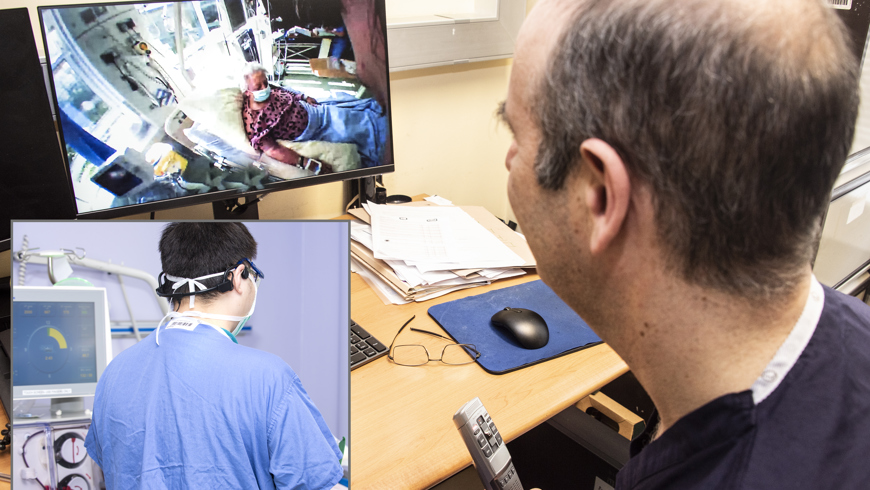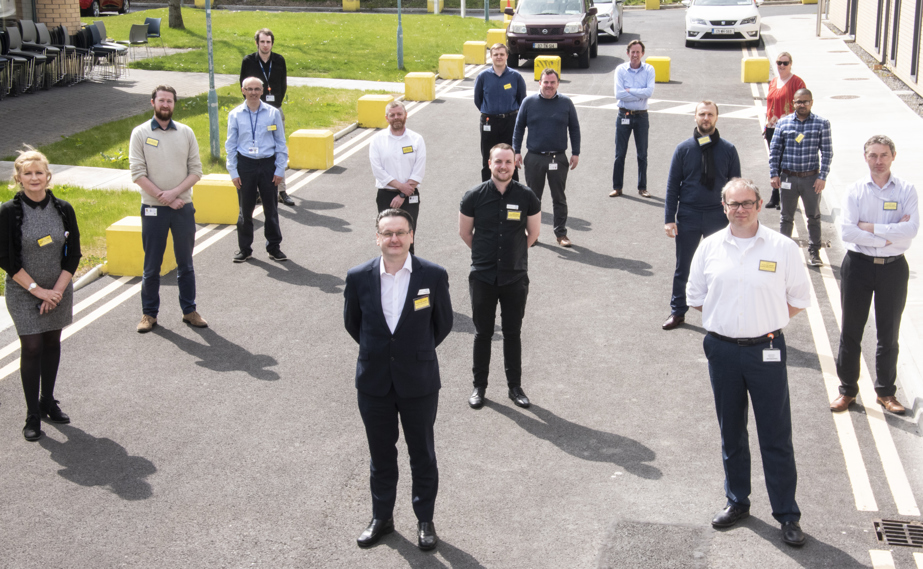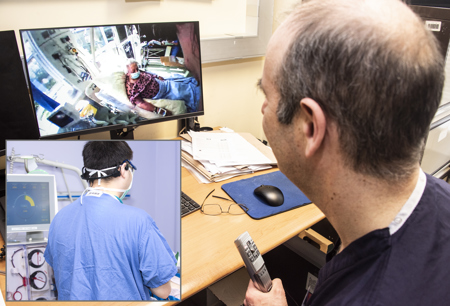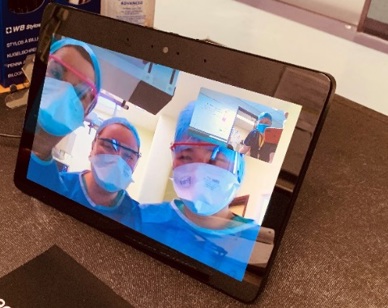
How Technology is helping TUH during the COVID-19 Pandemic
Technology such as Amazon’s Echo Show, FIRE HD tablets, iPad’s, video glasses, virtual clinics and lectures, a new app for staff and LUCY the robot is helping clinicians and patients during the pandemic
May 4th 2020 In recent weeks Tallaght University Hospital has introduced numerous new digital solutions to assist patient care and also enable patients and their families keep in touch during the COVID-19 pandemic. New technology combined with existing innovation has been put in place to support hospital staff communicating with colleagues in order to efficiently treat and diagnose patients as well as helping them provide support for community settings such as hospices and nursing homes.

Speaking about the impact COVID-19 is having on patients and staff, David Wall, Director of ICT at TUH said, “Last December the Hospital launched a five year strategy with a heavy emphasis on Digital Enabled Care, we did not realise that we would be introducing so many elements of that care within a few weeks. With the support of an incredible team of ICT, medical, nursing and Health and Social Care Professional staff the Hospital has been able to introduce a number of new innovations in the Hospital very quickly. The use of this technology is proving to be critical in supporting our response to patients’ needs during this challenging time. Combined with technology already in use in the Hospital, over the last number of weeks we have been enabling safe and efficient communication between colleagues as well as patients and their families. Advances in ICT at TUH have facilitated a number of ‘firsts’ for the Hospital including an online interactive lecture series using Zoom, medical teams being able to consult with colleagues using wearable cameras, remote monitoring and virtual visiting.”
Donations from companies, volunteer groups such as Covid4comfort.org and gift cards from Amazon have helped TUH enhance the technology being used in the Hospital. In ICU and Theatre, Echo Show devices enable two-way video calling so clinicians can consult with team members on video, rather than in person therefore reducing the level of foot traffic into a restricted area. The Hospital is also trialling voice activated, hands free devices that will also enabling communication between patients and their families over Skype.
Commenting on the assisted technology, Prof Paul Ridgway, Consultant Surgeon and Perioperative Director at TUH said, “The smart speaker technology enables our carers to more effectively communicate masked-face to masked-face. I have been very impressed how using Alexa has facilitated very effective staff to staff communications, reducing the need to enter areas where PPE is required saving both time and stock of PPE.”
Redzinc, an Irish based technology company have also donated five pairs of video glasses to TUH for six months. The wearable, point of view, wireless headsets are enabling medical teams to interact with each other in real time in order to diagnose and treat patients.
Dr. Peter Lavin, Consultant Nephrologist and Clinical Director of the Medical Directorate of TUH said, “The Redzinc glasses have been extremely useful and enable us to step into a clinical situation as if we were there. We are using them in theatre, the ED and ICU and they are helping us to reduce footfall in critical areas with vulnerable patients”


IPad’s been placed on all wards to help patients keep in contact with family and friends at a time when visiting is restricted in the Hospital. The iPads are housed in cleanable, healthcare compliant cases and have been set up with Skype, Facetime and Google Hangout.
Áine Lynch, Director of Nursing at TUH said, “Maintaining a human connection with friends and family is vitally important for our patients and their loved ones. In the absence of face to face visiting, virtual connection has become so important. The nursing staff are helping patients use the technology so they can see as much of their families and friends as possible during this time.”
As one of the two main teaching hospitals of Trinity College Dublin, the hospital specialises in the training and development of staff in the community and so Age-Related Healthcare at TUH have collaborated with the All-Ireland Institute of Hospice and Palliative Care to deliver an interactive virtual lecture series for nursing home staff to update them on changing guidelines and provide clinical education in order to enhance care. Four lectures have been delivered to date with an average of between 300 and 600 participants. Participants can submit questions in real time and themes are identified and answered by panellists.
Speaking about the innovative lecture series, Dr. Dan Ryan, Consultant Geriatrician at TUH said, “We have made the series as interactive as possible and the majority of the hour is dedicated to an open Q&A to provide a platform for answering practical questions that arise from staff. Nursing homes have traditionally been geographically cut-off from centres of learning and this current COVID crisis has exposed a historical lack of education investment provided to care homes”.
Other panellists have included TUH Consultants; Dr. John Cullen, Respiratory Consultant, Dr. Anna Rose Prior, Microbiologist, Prof. Sean Kennelly, Geriatrician with frequent panellist attendance from Dr. Stephen Higgins and Dr. Cliona Lorton, Palliative Care Consultants at TUH and Our Lady's Hospice along with Claire Noonan, Advanced Nurse Practitioner in Older Persons at TUH.
The Hospital Robot Doctor, LUCY, has continued to provide invaluable help during ward rounds to support staff and patients during the pandemic. To help support staff, a number of which are now working in locations outside of the Hospital or redeployed within the Hospital, a staff app has been developed to ensure they are kept up to date with hospital news. Pastoral Care have also launched a video service, “Chat with the Chaplain” enabling chaplains to virtually visit patients and can be access through mobile phone or email.
During this Pandemic, the Hospital is also supporting the care of over 1,000 residents in 14 local nursing homes. This sector has been particularly impacted by the COVID-19 pandemic and the TUH specialist team to support these services has used technology to facilitate communication and clinical review. Prof Sean Kennelly, Consultant Geriatrician at TUH said “Unfortunately nursing homes have been disproportionately impacted by COVID-19, with many residents becoming unwell. We have developed a telehealth outreach service for general practitioners and directors of nursing to our local residential care facilities, including video-consultations to support care in place. The multidisciplinary team has managed over 400 contacts in the last six-weeks, and this link to a specialist service has been essential in supporting these care facilities during a very challenging time.”
